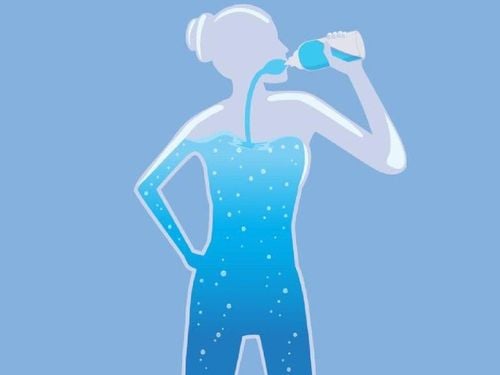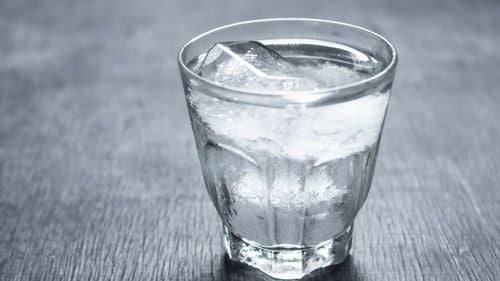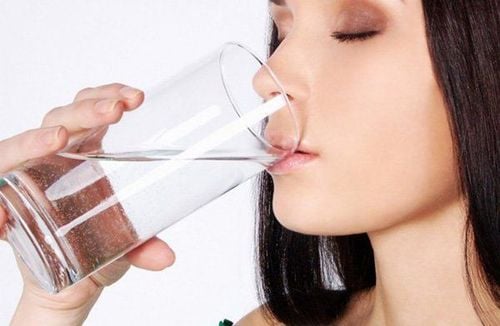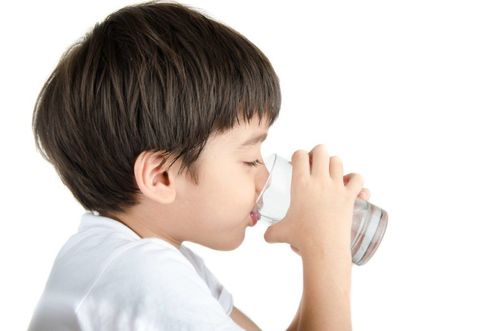This is an automatically translated article.
The article is professionally consulted by Master, Doctor Nguyen Thi My - Department of Medical Examination & Internal Medicine - Vinmec Danang International Hospital.Excess water in the body or dehydration are both conditions that adversely affect the health of each person. In most cases, the body loses more water.
1. Dehydrated body
1.1 What is dehydration? Dehydration is a condition in which the amount of water in the body is less than the amount of water out, causing the amount of water in the body to be out of balance in the downward direction. Water imbalance disrupts the balance of salt, mineral and blood sugar levels, which interferes with normal activities and causes a lot of damage to the body.1.2 Causes of dehydration Dehydration is common in the following cases:
People do not have the habit of drinking water regularly every day. People who do heavy work outside in the hot sun (such as electricians, builders, workers,...). Athletes often practice a lot. Elderly people eat poorly, causing the body to become severely dehydrated. Using medications such as diuretics, laxatives, and ACE inhibitors for high blood pressure can cause you to urinate more often or sweat, causing a water imbalance. In addition to the reasons mentioned above, some diseases also lead to dehydration such as:
Fever, diarrhea: Patients often vomit and have loose stools, causing severe dehydration of the body. Kidney failure: Begins around age 50 and becomes more severe around age 70. The kidneys begin to lose some of their ability to remove toxins from the blood, as the kidneys are less able to concentrate urine resulting in faster elimination of water from the body as we age. 1.3 Symptoms of dehydration Some common symptoms of dehydration are:
Thirst, you can feel thirsty a lot. Feeling dizzy or lightheaded. Chest palpitations. Less urine Dry mouth. Urine is dark yellow and thick. Muscle weakness. Dry skin.

Cerebral edema: After dehydration, if fluid intake is quickly replenished, causes the body to try to get more water into the cells, which can cause swelling and rupture some cells. The most serious is causing brain cells to swell. Epilepsy: Water imbalance i.e. electrolyte imbalance will disrupt conduction and lead to involuntary muscle spasms, sometimes loss of consciousness. Shock: This is one of the most serious and possibly life-threatening consequences of dehydration. This condition occurs when low blood volume lowers blood pressure and reduces the amount of oxygen in the body. Acute kidney failure: This is a potentially life-threatening complication that occurs when the kidneys are no longer able to remove excess fluids and waste products from the blood. Coma and death: If the body is severely dehydrated and not treated promptly and appropriately, it can cause coma and death.
2. Excess water in the body
2.1 What is excess water in the body? Usually, we only care about drinking enough water by loading a lot of water into the body, especially sports athletes, who are often dehydrated. However, sometimes drinking too much water also leads to excess water in the body. Excess water in the body is just as dangerous as dehydration.There are two types of excess water, which are:
Excessive water intake: Drinking more water than the kidneys can excrete through the urine, leading to the accumulation of too much water in the body. Water retention: When the body is unable to get rid of excess water, due to certain diseases, it leads to an excess of water in the body. 2.2 Causes of excess water in the body Some diseases can lead to excess water such as:
Liver disease. Kidney disease. Congestive heart failure. Syndrome of inappropriate diuretic hormone. 2.3 Symptoms of too much water in the body Excess water in the body can lead to symptoms such as:
Nausea, vomiting

Feel the muscles weaken, may have cramps or pain. Had a convulsion. Unconsciousness, coma.
3. Tests to assess water imbalance
Tests for assessing water imbalance are based on fluctuations in extracellular Na+ concentration to divide the following types of water disorders:Hypotonic dehydration: Protein increase, Na+ decrease, Hb increase, SLHC increase. Isotonic dehydration: Protein increased, Na+ normal, Hb increased, SLHC increased. Hypertonic dehydration: Protein increases, Na+ increases, Hb increases, SLHC increases. Hypertonic hypotonic water: Protid decreased, Na+ decreased, Hb decreased, SLHC decreased. Excess isotonic water: Protein decreased, Hb decreased, SLHC decreased. Hypertonic water excess: Protein decreased, Na+ increased, Hb decreased, SLHC decreased. Lack of water or excess water in the body can cause dangerous complications. When experiencing water imbalance, patients need to see a doctor soon for timely diagnosis and treatment.
Master. American doctor has more than 6 years of experience as an internal medicine doctor at Hue Central Hospital, Hue University of Medicine and Pharmacy Hospital; Tam Tri Da Nang Hospital; Danang Hospital. Currently, he is a General Internal Medicine Doctor at Vinmec Da Nang International General Hospital.
Please dial HOTLINE for more information or register for an appointment HERE. Download MyVinmec app to make appointments faster and to manage your bookings easily.














